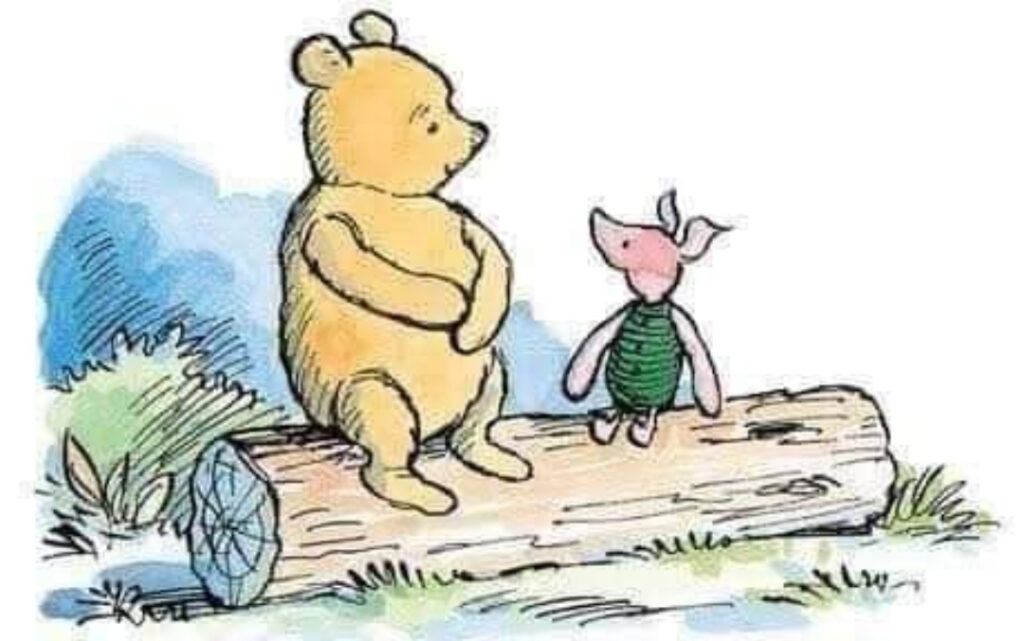“Today was a Difficult Day,” said Pooh.
There was a pause.
“Do you want to talk about it?” asked Piglet.
“No,” said Pooh after a bit. “No, I don’t think I do.”
“That’s okay,” said Piglet, and he came and sat beside his friend.
“What are you doing?” asked Pooh.
“Nothing, really,” said Piglet. “Only, I know what Difficult Days are like. I quite often don’t feel like talking about it on my Difficult Days either.
“But goodness,” continued Piglet, “Difficult Days are so much easier when you know you’ve got someone there for you. And I’ll always be here for you, Pooh.”
And as Pooh sat there, working through in his head his Difficult Day, while the solid, reliable Piglet sat next to him quietly, swinging his little legs…he thought that his best friend had never been more right.”

The above vignette is attributed to A. A. Milne and his fictional “bear of very little brain,” Winnie-the-Pooh. Milne didn’t actually write it, but does that matter? It’s the kind of sentiment we need when we experience days of trial and tribulation, and Piglet, in this text, is the perfect friend, offering support and an ear, but not pressuring Pooh to talk if he doesn’t want to. Not everyone has a best friend, but most of us have, among our inner circles, people who are the friends we need in specific moments. Maybe it’s a sister or cousin offering unconditional support. Maybe it’s a parent reminding their adult child that no one ever completely outgrows the need for a kind word or hug from Mom or Dad. Maybe it’s a brother or uncle who lets us rant and then takes us out to throw balls or catch fish – something physical that helps us release our emotions in a tangible way.
Having support is important, even when a day isn’t particularly challenging. But when a day is truly difficult – having support is essential. And equally essential is knowing how to support yourself.
So, what do I do when I’m in the throes of a difficult day? Here are five things:
- I give myself permission to slack off. Sure, sometimes pushing through is necessary, but most of the time, taking a step backward is more beneficial to me than struggling through a day where my head really isn’t in the game. If half a day lounging in pajamas or a late night of reading escapist literature or even soaking in a bubble bath so long I turn into a prune is what I need, I give myself that.
- I step away from media and social media. I admit, I’m a news junkie and armchair political pundit, so many – but not all – of my most difficult days are tied to the U.S. election cycle. That means it’s essential for me to turn off the news channels, shut down Facebook and Instagram, and even set my phone to do-not-disturb. Getting away from information overload helps me find my own center again, and also means the only thoughts in my head are my own.
- I reach out to others who are also struggling. Difficult days don’t occur in a bubble. Almost always someone I know is reacting to some or all of what I’m reacting to, and that old adage about misery loving company is true. Sharing grief or sorrow, or even just frustration, helps lessen it for all concerned.
- I meditate. Meditation, for me, doesn’t involve earth sounds, incense, or chanting (though if those things are your preference, by all means, use them!) For me, mediation is usually swimming or kayaking, playing in the garden, or writing. Sometimes it’s just sitting in a cool, quiet room with a lit candle and my favorite classical music (Bach’s Unaccompanied Cello Suites are my go-to.) When I had a bike, I found that meditative. There are no real rules to mediation, and it’s not necessarily about clearing your mind, so much as curating your thoughts.
- I sing. Okay, I know this sounds bizarre, but even though I identify as a writer, I was a musician first and I think in music. Singing helps me expend nervous energy, but also lets me play a character for four minutes at a time. If I’m angry at the world, singing angry-girl rock at the top of my lungs helps me purge my own anger. If I’m feeling like the world is unjust, I sing protest songs – music of conscience – and when I’m sad, I look for things that let me express my sadness and move through it. d. lang’s cover of “Hallelujah” and the Beatles’ “Let it Be” and “Here Comes the Sun” have gotten me through difficulties ranging from my nine-year-old nephew’s death from cancer, my last miscarriage, and several instances of global turmoil.
Difficult days come to all of us. There’s no competition for whose difficulty is the worst, or whose suffering is the deepest. What’s difficult for you, may not be difficult for me, and vice-versa. What helps, though, is to have support, whether it’s plan, a person, or a combination of the two.
I’d be remiss if I didn’t mention that the Online Care Circles that Breathing Spaces hosts twice a month are an excellent place to find support during the difficult days of being a caregiver. I’d be equally negligent if I didn’t remind you – and myself – that difficult days don’t last forever. Eventually, pain fades, grief lessens, frustration eases, and isolation is broken by friends and family. To quote a line from the musical Anything Goes, “It’s always darkest just before you turn on the light.”
So, if you – like me – need to wallow during your most difficult days, do so. Then turn on as many lights as it takes to see your way forward.
